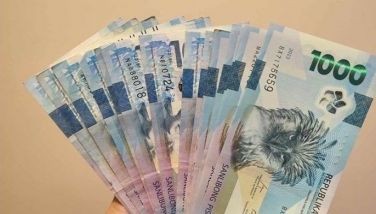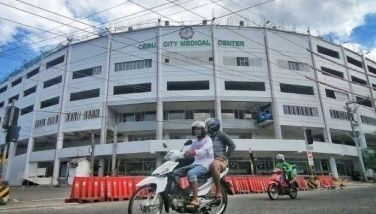Gwen, Tomas back move declaring Cebu as ecozone
May 25, 2006 | 12:00am
Like President Gloria Macapagal-Arroyo, Cebu Governor Gwendolyn Garcia and Cebu City Mayor Tomas Osmeña are open to the proposal of declaring the entire province as a special economic zone.
The lady governor yesterday said even in her previous talks with the Cebu Chamber of Commerce and Industry, she had already expressed her support to its proposal to get a presidential proclamation declaring Cebu as special economic zone "because this can only redound to the benefit of our local government units in the province."
Garcia revealed that when CCCI newly elected president Francis Monera broached this matter to Arroyo over a dinner at Marriott Hotel after the induction of CCCI officers Tuesday night, the President was reportedly receptive to the idea but that LGUs have to be consulted first because this might mean lesser income to them.
However, Garcia said that when they analyzed and examined the plan's possible effect, they found out that its not-so-good impact on income tax revenues is on the national level because of the tax holiday granted to firms or companies located within an ecozone.
"I said, but I believe Madam President eventually the long-term gains will far outweigh whatever short-term disadvantages or negative impact that this may have to the LGUs," Garcia reiterated as having told the President.
The governor said she understands that the Cebu-based businessmen are toying the idea of Cebu getting an ecozone declaration because it would mean that investments within the zone would enjoy income tax holiday and duty-free importation of capital equipment.
On the other hand, she said this would entail additional investments and more jobs on an island where its best resources are human resources "even as real estate values would shoot up once these investments would be put up in our different towns and cities."
But while he supports the idea, Osmeña believes it should be clarified what the declaration of an economic zone would mean and if indeed the declaration would cover the entire province. Osmeña said his idea of an economic zone is the concept being adopted by the Mactan Economic Processing Zone and the South Reclamation Project.
Osmeña is concerned that if the province would be declared an economic zone, local government units would be earning very less from the companies due to tax exemptions.
"We will be happy to work with them but we just can't say yes, let's be intelligent about it. Tell us the overall impact," Osmeña said yesterday.
If the declaration would push through, the mayor is worried that local government units might just depend on the Internal Revenue Allotment from the national government. While the declaration might bring in investors, the mayor is not too optimistic that more jobs would be subsequently created.
Should the idea materialize, Osmeña is proposing that the province be granted a 10-year exemption from the minimum wage law. This way, many investors would be attracted to open businesses because of the low wages, something that workers may not mind because the cost of living in the city and the province is relatively low.
Establishment of an economic zone needs proclamation issued by the President, subject to the evaluation and recommendation of the Philippine Economic Zone Authority, based on a detailed feasibility and engineering study which must conform to the criteria set forth under section 6 of Republic Act 7916, otherwise known as "The Special Economic Zone Act of 1995."
Under the same law, business establishments operating within the economic zones shall be entitled to the fiscal incentives as provided for under Presidential Decree No. 66, the law creating the Export Processing Zone Authority, or those provided under Book VI of Executive Order No. 226, otherwise known as the Omnibus Investment Code of 1987.
Furthermore, tax credits for exporters using local materials as inputs shall enjoy the same benefits provided for in the Export Development Act of 1994.
Also, they shall be exempted from taxes under the National Internal Revenue Code but that in lieu of paying taxes, five percent of the gross income earned by all businesses and enterprises within the economic zone shall be remitted to the national government.
This five percent shall be shared and distributed as follows: three percent to the national government; one percent to the local government units affected by the declaration of the economic zone in proportion to their population, land area, and equal sharing factors; and one percent for the establishment of a development fund to be utilized for the development of municipalities outside and contiguous to each economic zone.
This is provided, however, that the respective share of the affected local government units shall be determined on the basis of the following formula: population - 50 percent; land area - 25 percent; and equal sharing - 25 percent. - Cristina C. Birondo and Joeberth M. Ocao
The lady governor yesterday said even in her previous talks with the Cebu Chamber of Commerce and Industry, she had already expressed her support to its proposal to get a presidential proclamation declaring Cebu as special economic zone "because this can only redound to the benefit of our local government units in the province."
Garcia revealed that when CCCI newly elected president Francis Monera broached this matter to Arroyo over a dinner at Marriott Hotel after the induction of CCCI officers Tuesday night, the President was reportedly receptive to the idea but that LGUs have to be consulted first because this might mean lesser income to them.
However, Garcia said that when they analyzed and examined the plan's possible effect, they found out that its not-so-good impact on income tax revenues is on the national level because of the tax holiday granted to firms or companies located within an ecozone.
"I said, but I believe Madam President eventually the long-term gains will far outweigh whatever short-term disadvantages or negative impact that this may have to the LGUs," Garcia reiterated as having told the President.
The governor said she understands that the Cebu-based businessmen are toying the idea of Cebu getting an ecozone declaration because it would mean that investments within the zone would enjoy income tax holiday and duty-free importation of capital equipment.
On the other hand, she said this would entail additional investments and more jobs on an island where its best resources are human resources "even as real estate values would shoot up once these investments would be put up in our different towns and cities."
But while he supports the idea, Osmeña believes it should be clarified what the declaration of an economic zone would mean and if indeed the declaration would cover the entire province. Osmeña said his idea of an economic zone is the concept being adopted by the Mactan Economic Processing Zone and the South Reclamation Project.
Osmeña is concerned that if the province would be declared an economic zone, local government units would be earning very less from the companies due to tax exemptions.
"We will be happy to work with them but we just can't say yes, let's be intelligent about it. Tell us the overall impact," Osmeña said yesterday.
If the declaration would push through, the mayor is worried that local government units might just depend on the Internal Revenue Allotment from the national government. While the declaration might bring in investors, the mayor is not too optimistic that more jobs would be subsequently created.
Should the idea materialize, Osmeña is proposing that the province be granted a 10-year exemption from the minimum wage law. This way, many investors would be attracted to open businesses because of the low wages, something that workers may not mind because the cost of living in the city and the province is relatively low.
Establishment of an economic zone needs proclamation issued by the President, subject to the evaluation and recommendation of the Philippine Economic Zone Authority, based on a detailed feasibility and engineering study which must conform to the criteria set forth under section 6 of Republic Act 7916, otherwise known as "The Special Economic Zone Act of 1995."
Under the same law, business establishments operating within the economic zones shall be entitled to the fiscal incentives as provided for under Presidential Decree No. 66, the law creating the Export Processing Zone Authority, or those provided under Book VI of Executive Order No. 226, otherwise known as the Omnibus Investment Code of 1987.
Furthermore, tax credits for exporters using local materials as inputs shall enjoy the same benefits provided for in the Export Development Act of 1994.
Also, they shall be exempted from taxes under the National Internal Revenue Code but that in lieu of paying taxes, five percent of the gross income earned by all businesses and enterprises within the economic zone shall be remitted to the national government.
This five percent shall be shared and distributed as follows: three percent to the national government; one percent to the local government units affected by the declaration of the economic zone in proportion to their population, land area, and equal sharing factors; and one percent for the establishment of a development fund to be utilized for the development of municipalities outside and contiguous to each economic zone.
This is provided, however, that the respective share of the affected local government units shall be determined on the basis of the following formula: population - 50 percent; land area - 25 percent; and equal sharing - 25 percent. - Cristina C. Birondo and Joeberth M. Ocao
BrandSpace Articles
<
>
- Latest
- Trending
Trending
Latest
Trending
Latest
Recommended




















